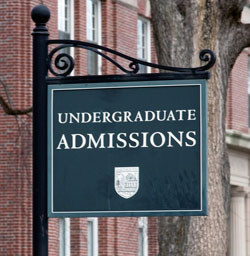Philadelphia Inquirer – September 26, 2010
It’s that time of year again. High school seniors are deciding where they will apply to college, and for a sizable fraction the pivotal question is, Should I apply early?
Early application options vary by institution, but the one that generates the most debate at kitchen tables and in college counseling offices around the country is “early decision,” popularly known as ED.
The ED candidate chooses one college early in her senior year, and if that college admits her, she must enroll.
Critics of early decision, and there are quite a few, have legitimate complaints. They point out that colleges created the system to serve their own purposes, not to benefit the applicants. This is certainly true. Admissions directors face tremendous pressure to meet enrollment goals. Coming in significantly under, or over, the mark can mean either not enough money to pay the bills, or not enough dormitory space and faculty to house and teach the students who show up in September. Given the number of difficult-to-control variables in the admissions process, the chance to “lock in” a quarter to a half of the class by the end of December is too tempting a prospect for many private institutions to pass up.
They also note that the student, in most cases still 17 years old, is being asked to sign a binding contract with a single college just a month or two into her senior year. Skeptical counselors and parents wonder how this can be expected to produce a well-thought-out decision.
And for the group of applicants seeking need-based financial aid, making the ED commitment rarely makes sense, because doing so means giving up the opportunity to compare grant, loan, and scholarship packages from a number of colleges.
Still, the fact is that ED application numbers have risen steadily for the past 30 years.
A desire, on the part of many students, to simply get the process over with clearly plays a role, but colleges aren’t the only participants in the game who have something to gain by thinking strategically. The ED option deserves consideration for the following reasons:
1. It is a chance to make the decision to apply count.
Colleges with competitive pools receive enough applications overall that they must turn down some students whose academic records are roughly comparable to those of others they admit. For the student whose academic profile puts her in that it-could-go-either-way zone, applying ED can increase her chances of being accepted.
2. There is little evidence that high school seniors make better college choices in the spring than they do in the fall.
The occasional student who returns a year or two after graduation to talk to us about transferring is rarely an ED case. In fact, I can remember only one in almost 20 years who was. In the end she decided not to make a move.
3. ED, like other early application and early response options, provides valuable feedback no matter what the result.
A decision by a college to defer an applicant for later consideration in the regular pool can make it easier to predict how other schools on that student’s list may respond to her applications. A rejection, though painful in the short run, often has the highly beneficial effect of focusing the student’s attention on other, more realistic possibilities.
Ironically, some ED applicants fear admission almost as much as rejection. “If I get in, then I have to go!” Well, yes, but then the “worst-case scenario” is that the student must attend a place she has visited, spent some time thinking carefully about, selected, and ostensibly likes. That’s not so terrible, and putting the choice off until spring won’t make it go away.


I enjoyed your Op-ed piece in The Philadelphia Inquirer. With three children heading to college in the not too distant future, I found it interesting. [And with respect to your history-related pieces,] I am working on a play about Lincoln now. Though my great grandfather and 90 other Tillerys fought for the Confederacy, I have a love of Lincoln as strong as that of any Yankee.
Regards,
Kelly
Yo Grant–You’re famous! Every time I open the Inquirer I see another excellent op-ed that you have written!
Rick
Please accept my apologies for not getting to you a while ago about your latest article, Early Decisions, in the Inky. As usual, nicely done—- with one glaring exception: E.D.? what’s that all about? Millions of embarrassed American men assume any article referencing “ E D “ is referring to Erectile Disfunction, not Early Decision! C’mon, big guy— get a better moniker for the early decision process. EP? E A D ??? I don’t know; get creative!!
All the best.
Jim